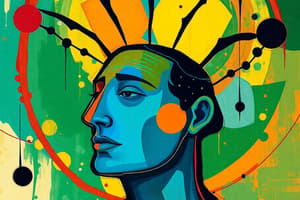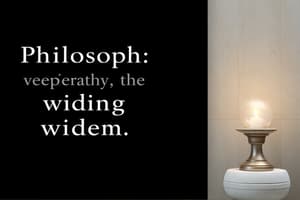Podcast
Questions and Answers
How does prioritizing tangible outcomes over intangible ideas, as seen with technological advancements, present a challenge to philosophy?
How does prioritizing tangible outcomes over intangible ideas, as seen with technological advancements, present a challenge to philosophy?
- It encourages philosophers to focus solely on practical applications of their ideas.
- It diminishes the perceived relevance and value of philosophical inquiry. (correct)
- It fosters a greater appreciation for philosophical jargon among the general public.
- It enriches philosophical discourse by providing concrete examples for abstract theories.
What is the core idea behind re-grounding philosophy?
What is the core idea behind re-grounding philosophy?
- To prove that philosophy is superior to science and technology.
- To focus solely on abstract theoretical concepts, avoiding real-world applications.
- To use philosophical jargon extensively to maintain its academic integrity.
- To highlight philosophy's practical value and relevance in modern life. (correct)
Which of the following is a key assumption made about philosophy, which can make it difficult?
Which of the following is a key assumption made about philosophy, which can make it difficult?
- Philosophy is speculative and impractical. (correct)
- Philosophy is inherently easy to understand and accessible to everyone.
- Philosophy is irrelevant to science and technology.
- Philosophy is primarily concerned with practical solutions to everyday problems.
How did early societies, characterized by a 'Utopian State,' view the concept of a 'good life'?
How did early societies, characterized by a 'Utopian State,' view the concept of a 'good life'?
How does the Western perspective generally approach the exchange of ideas and goods?
How does the Western perspective generally approach the exchange of ideas and goods?
What central belief characterizes the Eastern perspective?
What central belief characterizes the Eastern perspective?
According to the information, what unique trait distinguishes humans from other beings?
According to the information, what unique trait distinguishes humans from other beings?
How does John Locke describe the human person?
How does John Locke describe the human person?
What is Immanuel Kant's perspective on the human person?
What is Immanuel Kant's perspective on the human person?
According to Viktor Frankl, what is a fundamental drive in human existence?
According to Viktor Frankl, what is a fundamental drive in human existence?
According to Erich Fromm, what role does conscience play in human life?
According to Erich Fromm, what role does conscience play in human life?
According to St. Thomas Aquinas, what is the role of conscience?
According to St. Thomas Aquinas, what is the role of conscience?
What is the focus of ethics as a practical and normative science?
What is the focus of ethics as a practical and normative science?
What is the central aim of ethics?
What is the central aim of ethics?
What role do values play in ethics?
What role do values play in ethics?
What does ethics teach in relation to material goods and moral qualities?
What does ethics teach in relation to material goods and moral qualities?
What is the purpose of general (normative) ethics?
What is the purpose of general (normative) ethics?
What is the primary focus of applied (special) ethics?
What is the primary focus of applied (special) ethics?
How do 'human acts' differ from 'acts of man'?
How do 'human acts' differ from 'acts of man'?
How is goodness perceived in modern times, according to the text?
How is goodness perceived in modern times, according to the text?
Flashcards
Philosophy
Philosophy
Love of wisdom.
Philosophizing
Philosophizing
Seeking to understand fundamental truths about ourselves, the world, and our relationships.
Speculative (in Philosophy)
Speculative (in Philosophy)
Ideas focused on abstract theoretical concepts rather than practical, real-world issues.
Impractical (in Philosophy)
Impractical (in Philosophy)
Signup and view all the flashcards
Viktor Frankl's View
Viktor Frankl's View
Signup and view all the flashcards
General (Normative) Ethics
General (Normative) Ethics
Signup and view all the flashcards
Applied (Special) Ethics
Applied (Special) Ethics
Signup and view all the flashcards
Human Acts
Human Acts
Signup and view all the flashcards
Acts of Man
Acts of Man
Signup and view all the flashcards
Involuntary actions
Involuntary actions
Signup and view all the flashcards
Western Beliefs
Western Beliefs
Signup and view all the flashcards
Eastern Beliefs
Eastern Beliefs
Signup and view all the flashcards
Study Notes
- Philosophy is the love of wisdom.
- "Philo" means love, and "Sophia" means wisdom.
- A philosopher is a lover of wisdom.
- Philosophizing is the act of seeking to understand fundamental truths about ourselves, the world, and our relationships.
- It involves a search for truth.
Common Assumptions about Philosophy
- Philosophy is often considered difficult, speculative, and impractical.
- Speculative: Focused on abstract, theoretical ideas rather than real-world issues.
- Impractical: Perceived as having little to no application in everyday life and is only for intellectuals.
What Makes Philosophy Difficult
- Philosophy is misunderstood as focusing more on speculation.
- Students consider philosophy irrelevant due to the rise of science and technology.
Challenges in Modern Times
- Technological advancement prioritizes tangible over intangible ideas.
- The use of philosophical jargon alienates the general audience.
Re-Grounding Philosophy
- Philosophy needs to connect to real life to be relevant.
- Philosophy is practical and valuable in modern life by ethical principles as tools for achieving a good and meaningful life.
The Concept of a Good Life
- Every person seeks a good life given that life was naturally good.
- In early times the utopian state upheld the welfare of all with no selfishness/individuality, and communities were harmonious.
Beliefs - East vs West
- Western Beliefs: Focus on exchange of ideas alongside goods causing trigger questions due to differences in customs.
- Eastern Beliefs: Man and nature are one and inseparable striving for self-perfection through existance with sustenance, not accumulation
Unique Traits of a Human Person
- Humans possess the capacity to reason and question their purpose and the meaning of life.
Man as a Person of Goodness and Traits
- John Locke: viewed the human person as a "thinking intelligent being with reason and reflection”. He belived humans naturally distinguish good from bad, and are inclined toward goodness, tied to moral acceptability and the avoidance of pain.
- Immanuel Kant: described the human person as autonomous, self-regulating with inherent worth and dignity.
- Viktor Frankl: believed humans strive to find meaning in life with existence self-determined, shaped by personal decisions and values.
- Erich Fromm: stated conscience helps humans identify life goals and moral norms.
- St. Thomas Aquinas: thought conscience reveals moral law and guides aspirations for the good.
- There is a noted need to redefine ethics from goodness tied to moral norms in traditional times to goodness linked to physical pleasures in modern times.
Ethics
- Ethics is derived from the Greek word "ethos" (customs, character, behavior).
- Ethics is a practical and normative science that studies human acts to understand the good life.
- Ethics are a set of rules influenced by society and individual standards that involves the study of human actions and moral implications.
- Ethics guide individuals towards a meaningful and moral existence.
- Ethics is about assessing theories ability to provide moral standards, not justifying them.
Role of Ethics in Human Life
- Historically, ethics has been viewed as a solution to moral problems.
- Plato considered ethics as the "Supreme Philosophy" for the attainment of happiness and the highest good.
Ethics as Science
- The systematic study of morality is a practical science for everyday life and actions using application of knowledge to guide behavior.
- As a normative science, ethics sets norms and guidelines for human actions.
- It helps distinguish good and bad actions and aids in maintaining moral direction in life.
Types of Actions
- Voluntary Actions: Actions done with understanding and free will.
- Involuntary Actions: Actions done without knowledge or against one's will.
- Human Acts: Actions done with knowledge and full consent of the will.
- Acts of Man: Spontaneous actions, like breathing or unconscious reactions, not driven by intellect or will.
Role of Values in Ethics
- Values define what is desirable, useful, and significant.
- Ethics guides individuals in choosing actions that align with their ideal vision and moral obligations.
Importance of Ethics
- Provides understanding of the nature of good and moral living, guidelines for living right and attaining goodness, and guides individuals in their search for meaning, happiness, and fulfillment, investigates the meaning and purpose of life.
- Ethics teaches that true fulfillment is not found in material goods, but in developing moral qualities, helps in understanding their purpose.
Division of Ethics
- General (Normative) Ethics: Focuses on the general and universal concepts and principles that serve as the foundation of morality; to identify moral norms (good or evil actions).
- Applied (Special) Ethics: Focuses on specific situations using principles of general ethics and applies moral concepts to life situations to resolve moral problems.
Studying That Suits You
Use AI to generate personalized quizzes and flashcards to suit your learning preferences.




